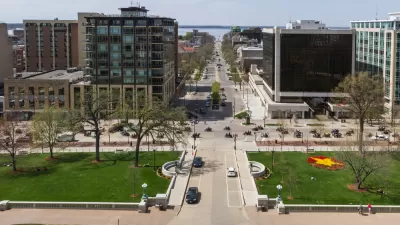A local alderman makes the case for a one percent sales tax dedicated to providing public funding for a new stadium to house the Milwaukee Bucks.
Alderman Robert Bauman penned a statement in response to recent development in the ongoing saga over the stadium deal for the Milwaukee Bucks NBA franchise. The risk to the franchise's future in Milwaukee comes from the gap in funding necessary to build a new arena for the team.
"It appears that the state legislature has balked at Governor Walker’s original $220 million funding proposal. It appears they are focused on approving a funding package of $150 million. This leaves a funding gap of at least $100 million ($500 million in projected cost, less $250 million in private capital and $150 million in state financing). State legislative leaders have suggested that the city and county come up with this $100 million or what could be an even bigger share if the actual costs of construction run over $500 million."
Alderman Bauman notes that anything over $50 million is not a plausible figure for the city—tax increment financing will be unavailable because the stadium would be exempt from property taxes. He does, however, suggest a one percent sales tax—a plan endorsed by the Cultural and Entertainment Capital Needs Task Force created by the Metropolitan Milwaukee Association of Commerce. The addendum to a separate press release [pdf] lays out the one percent tax scheme.
FULL STORY: A new funding approach is needed if we are going to retain the Bucks: The One Percent Solution

Planetizen Federal Action Tracker
A weekly monitor of how Trump’s orders and actions are impacting planners and planning in America.

Restaurant Patios Were a Pandemic Win — Why Were They so Hard to Keep?
Social distancing requirements and changes in travel patterns prompted cities to pilot new uses for street and sidewalk space. Then it got complicated.

Map: Where Senate Republicans Want to Sell Your Public Lands
For public land advocates, the Senate Republicans’ proposal to sell millions of acres of public land in the West is “the biggest fight of their careers.”

Maui's Vacation Rental Debate Turns Ugly
Verbal attacks, misinformation campaigns and fistfights plague a high-stakes debate to convert thousands of vacation rentals into long-term housing.

San Francisco Suspends Traffic Calming Amidst Record Deaths
Citing “a challenging fiscal landscape,” the city will cease the program on the heels of 42 traffic deaths, including 24 pedestrians.

California Homeless Arrests, Citations Spike After Ruling
An investigation reveals that anti-homeless actions increased up to 500% after Grants Pass v. Johnson — even in cities claiming no policy change.
Urban Design for Planners 1: Software Tools
This six-course series explores essential urban design concepts using open source software and equips planners with the tools they need to participate fully in the urban design process.
Planning for Universal Design
Learn the tools for implementing Universal Design in planning regulations.
Heyer Gruel & Associates PA
JM Goldson LLC
Custer County Colorado
City of Camden Redevelopment Agency
City of Astoria
Transportation Research & Education Center (TREC) at Portland State University
Camden Redevelopment Agency
City of Claremont
Municipality of Princeton (NJ)




























